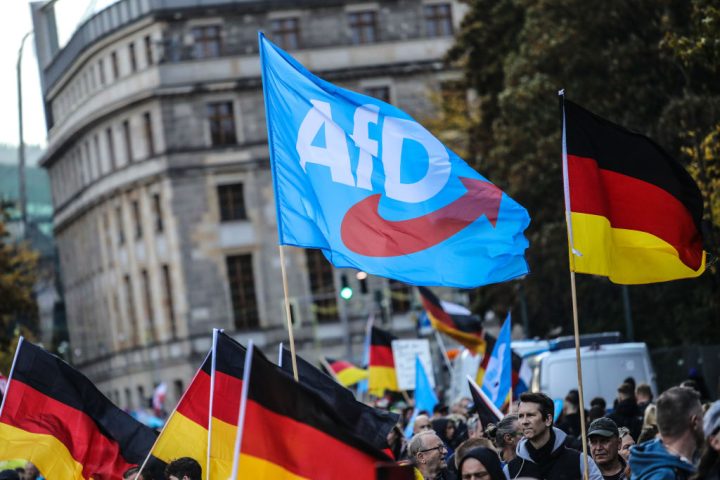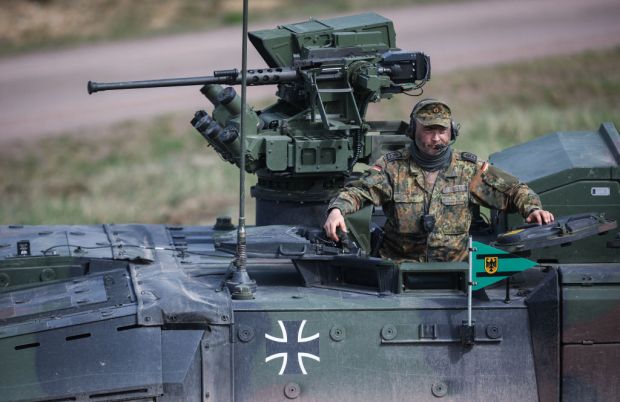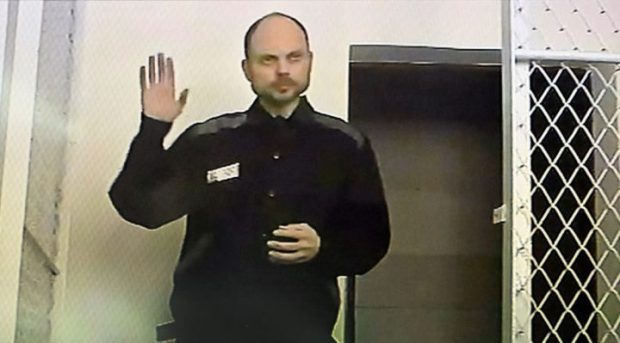Alternative für Deutschland (AfD), Germany’s far-right populist party, is enjoying a surge in support. A poll by broadcaster ARD this month revealed that 18 per cent of voters backed the AfD – its highest rating since the party was founded in 2013. This level of support – which puts the AfD on level pegging with the SPD – is ringing alarm bells in Berlin.
Since the end of the second world war, Germany’s post-war identity has been moulded around coming to terms with its history. Germans even have a word for it: ‘Vergangenheitsbewältigung’. The national mantra for eight decades has been ‘never again’. But is something sinister afoot in German politics?
AfD’s gains in the polls strike at the heart of the identity painstakingly crafted by Germany since 1945
ARD’s damning poll revealed that support for Germany’s traffic light coalition government, made up of the SPD, the liberal FDP and the Greens, was steadily melting away. A further nail in the coffin for the coalition came last Friday, when a YouGov survey revealed that a fifth of Germans would vote for the AfD in an election. Support for the SDP had ebbed even lower to 19 per cent; the Greens and FDP managed just 18 per cent between them.
Germany’s mainstream parties have fallen over themselves to point fingers at each other over where the blame for the AfD’s surge in popularity lies. Friedrich Merz, the leader of the centre-right opposition party CDU/CSU, accused the governing coalition and ‘particularly the Greens’ for being responsible for the AfD’s rise. Ricarda Lang, co-chair of the Greens, hit back, saying that politicians should work together ‘instead of pointing fingers at each other and losing themselves in one-sided accusations. Because that only strengthens the AfD.’
Those who fear the AfD have good reason to do so. Last year, a court in Cologne ruled that the AfD was a threat to democracy and granted permission for it to be monitored by the country’s security services. This year, its youth branch was labelled an extremist group. In May, Björn Höcke, the local leader of the AfD’s Thuringia branch was charged for intentionally using a Nazi stormtrooper slogan at a campaign rally (Nazi symbolism, including emblems, slogans and flags are strictly banned in Germany; using them can be punishable by up to three years in prison).
However, with Germany plagued by a series of economic, social and cultural issues and a government more focussed on political point scoring than any sort of effective governing, it is hardly a surprise that some Germans are looking elsewhere for political leadership. Disenchanted voters are turning to the AfD over what they see as the party’s fearlessness in voicing what others are too nervous to say, and seem undeterred by the party’s unsavoury comparisons to the Nazi party.
So what exactly is responsible for the AfD climbing through the polls? According to the ARD survey, the issues most concerning those backing the AfD are immigration, followed by the energy crisis and climate policy more generally. Concerns over Scholz’s handling of the economy, after Germany officially entered a recession last month, also play into rising support for the party: 84 per cent of respondents said Scholz has failed to show clear leadership.
In April, the Federal Office for Migration and Refugees released figures showing the number of asylum claims had doubled in the ten months to March to 25,000 a month. How to solve the large number of migrants entering the country is something Scholz’s government has been battling since they came to power.
That migration is the number one concern for the majority of AfD supporters should hardly be surprising. The AfD experienced a surge of similar proportions after 2015 when Angela Merkel introduced her ‘open doors’ policy, allowing over 1.2 million people to seek asylum in the country. The party’s rhetoric on the subject has been notoriously hardline, with their manifesto outlining their proposal to stop illegal migration and immediately send back those whose asylum claims are rejected.
But there are other factors at play in the rise of the AfD. The consequences of Scholz’s inability to get a handle on the cost of living crisis and soaring energy costs in the wake of the war in Ukraine are also coming home to roost. While the war is not the only factor contributing to soaring prices, it is clear this is the reason Germans most strongly associate with it. Many also feel alienated by the coalition government’s messy efforts to push through costly environmental reforms on petrol-fuelled cars and oil and gas boilers at a time when households are struggling to make ends meet.
Since the beginning of the war in Ukraine, support for the country in Germany has, at best, been lukewarm. The close historic relationship between Germany and Russia from the 1950s onwards has complicated perspectives over how far Germans believe their country should get involved in ending the conflict. While just 43 per cent of Germans think their country’s current support for Ukraine is appropriate, 37 per cent of AfD supporters think it goes too far.
This uncertainty is something the AfD have also capitalised on, offering those Germans opposed to the war a flag to rally around. The party is known for its pro-Russia and pro-Putin stance, and since last February has called for sanctions against Russia to be scrapped and warmer relations between the countries to be restored. The influx of more than 1 million Ukrainian refugees into Germany since the war began has not helped local attitudes.
The AfD enjoys its strongest backing in the regions that used to belong to the former East Germany (GDR). Three of the former GDR states, Brandenburg, Saxony, Thuringia are scheduled to have elections next year – popularity for the AfD is currently averaging 29 per cent there. This is a legacy of Germany’s divided history, and arguably a failure of previous post-1989 German leaders: even nearly 35 years after the country’s reunification, these parts of the country experience lower employment and higher poverty levels – and often feel ignored by politicians in Berlin.
When Scholz announced last February that the invasion of Ukraine represented a ‘Zeitenwende’ or ‘changing of the times’, he almost certainly didn’t anticipate that this would apply to Germany’s domestic, as well as international, politics. Granted, Scholz does not bear sole responsibility for the domestic problems now destabilising the country – many, including the environment that led to soaring energy prices last winter, are a legacy of Angela Merkel’s time in office. But he is now being judged against his failure to tackle them – and the AfD are cashing in.
The rise of the AfD in Germany is not merely deeply humiliating for Scholz, but represents a window into the menacing future the country could face if the traffic light coalition can’t get a grip on its government. The AfD will do its best to show it is not the modern day successor to the Nazi party and will no doubt continue to entice voters with its show of ‘respectability’. But the party’s gains in the polls strike at the heart of the identity painstakingly crafted by the country since 1945. If Germany continues to lurch towards the far right, it’s not just a democratic crisis it will trigger, but also an existential one.
Got something to add? Join the discussion and comment below.
Get 10 issues for just $10
Subscribe to The Spectator Australia today for the next 10 magazine issues, plus full online access, for just $10.




















Comments
Don't miss out
Join the conversation with other Spectator Australia readers. Subscribe to leave a comment.
SUBSCRIBEAlready a subscriber? Log in